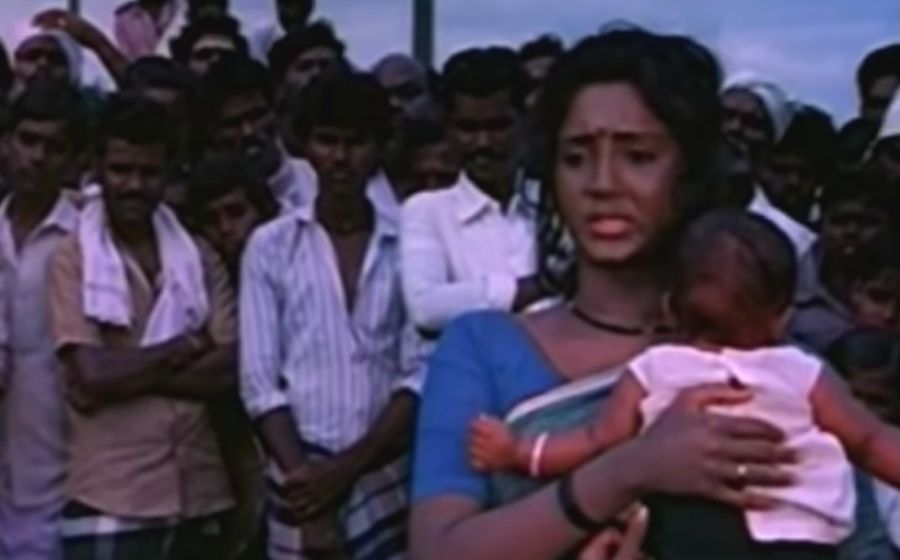
Marikozhundhu: A film that questioned the glamour surrounding fairness

The debate over racial discrimination recently prompted Hindustan Unilever Limited (HUL) to drop the word ‘Fair’ from the name of its popular fairness cream Fair & Lovely. Many advertisements promoting Fair & Lovely have made a lot of young women to feel inferior to those with a fair complexion.
However, this topic has rarely been discussed on the big-screen. One of the few films that questioned the glamour surrounding fairness is Marikozhundhu, a Tamil movie directed by Puthiyavan, who had assisted well-known filmmaker Bharathiraja. The film depicted the struggles of a dark-skinned woman in a village in Tamil Nadu.
There is an eerie connection between the film and Fair & Lovely advertisements. While the movie was released in 1991, the decade made way for the telecast of such advertisements, relayed in state-run broadcaster Doordarshan, that helped the product enter almost every household in the country.
Initially, these advertisements had actors like Juhi Chawla promoting the brand. Later, the company changed its strategy and showed the girl next door, who dreamt of becoming an air hostess or television anchor, gaining confidence after using Fair & Lovely. With the change in strategy, the size of a Fair & Lovely tube also changed from five inches to three.
Life of Marikozhundhu
However, Marikozhundhu, a dark-skinned kind-hearted woman of Kottampatti village, neither had an opportunity to use fairness creams, nor did she feel inferior to fair-skinned women. Aishwarya, daughter of veteran actor Lakshmi, played the title role.
Following his mentor Bharathiraja’s style, Puthiyavan had begun the film with an arrival of a train to Marikozhundhuppatti village. Seenu (Ramesh Aravind) and his daughter Chithra (also played by Aishwarya) alight from the train. They come to the village from Chennai to attend a temple festival.
Surprised by villagers paying overwhelming respect to the father-daughter duo, Chithra asks Seenu the reason behind it. Seenu not only reveals the story of Marikozhundhu of Chitra, but also to the audience through a lengthy flashback.
Marikozhundhu is a women who lacks so-called feminine qualities like shyness. Living with grandmother, she is always a target of fun for villagers as she walks like a man. So, she wants to get married soon. However, several men reject her due to her dark skin. So, villagers consider Marikozhundhu as Moodevi (Goddess of misfortune).
Related News: ‘Mera Saaya’ to ‘Veer Zaara’: Timeless melodies Madan Mohan left behind
One day, the young Seenu, son of wealthy landlord Vinu Chakravarthy, returns to the village during holidays. He comes to know about Marikozhundhu and they happen to have intercourse. When villagers find this, Seenu’s father agrees to get his son married to Marikozhundhu.
However, Seenu, who had been brought up in a city, doesn’t consent to the marriage as he is in love with his childhood sweetheart. When Marikozhundhu comes to know of this, she stops the marriage. But she soon gets pregnant. Though Seenu’s mother (Manorama) tries to convince her, Marikozhundhu is not ready to live with Seenu.
So, Seenu’s father plans to send Marikozhundhu out of the village. She too agrees to leave with her daughter. On her way to the railway station, she overhears the conversation between the owner of a pesticide company in the village and a health inspector. She comes to know that the company had let out the chemical waste into a pond.
Related News: Maverick RGV’s latest shocker: Caste violence gets an emotional makeover
As villagers have planned to conduct a ceremony in the pond, she informs them not to consume the water. But villagers, who dislike her, do not believe Marikozhundhu’s words. Finally, she gets into the pond and drinks the water, only to die in Seenu’s lap.
However, Seenu realises his fault and marries Marikozhundhu when she is about to die. In order to appreciate her sacrifice, people rename the village Marikozhundhuppatti, after the women.
One of the plus points of the movie was its dialogues. Lines such as Ava oru drishti bommai (she is like a doll that prevents evil eye), Aambala maathiri nadakkura (she has the gait of a man), Un tholai eluthi vechittu po (please write a will that you will give me your skin) pushes the audience to an emotional state.
Deva had composed music for the film which had a popular number Kannadasaney Kannadasaney. Many think that the song was composed by Ilayaraja. The film also had comedy sequences of the popular duo Goundamani and Senthil. But the film was a box-office disappointment.
Similarities in real life
In the early 2000s, many dermatologists started questioning the efficacy of fairness creams and several women’s groups came out against the product. The Unilever and its Indian subsidiary is Hindustan Unilever Limited were accused of promoting racism.
Unilever also earned a bad reputation due to its thermometer production unit in Kodaikanal. The now-closed unit in the hill station had contaminated land and water resources, allege activists. The people who had been affected by the pollution have not got justice or compensation until now, they say.
“They’ve come this far, but choose to miss the point. A fairness cream by any other name is still a fairness cream. Perpetuating the beauty myth by subterfuge. Unilever is consistent with double standards — Kodaikanal, Fair & Lovely just two examples” tweeted environmental activist Nityanand Jayaraman, who had taken forward the fight against Unilever.
“In Kodaikanal, many women had been affected due to mercury pollution. They have reproductive health issues and brain diseases. Their spouses and children have been affected by kidney ailments, etc. “In the UK, where Unilever is headquartered, if land is contaminated with mercury the way it has been in Kodaikanal, Unilever would need to clean it up to a standard that is 20 times more stringent than what it plans to do in India. And, it has not prevailed on our regulators to make the company accountable. If this is not racism, then what is?” asks Jayaraman.”

